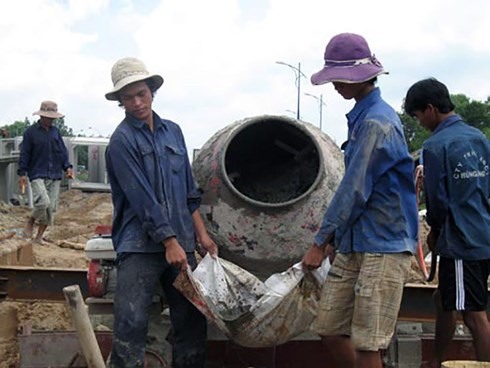 Society
Society

As many as 76.7 per cent of informal workers do not have a contract of employment and do not enjoy social welfare policies.
 |
| No-contract workers at construction sites are one of the informal labourer groups, which do not enjoy social welfare policies.— Photo: vov.vn |
HÀ NỘI — As many as 76.7 per cent of informal workers do not have a contract of employment and do not enjoy social welfare policies.
These figures were presented at the Informal Employment Workshop organised jointly by the International Labour Organisation (ILO) and the Ministry of Labour, Invalids and Social Affairs Employment Department earlier this week in Hà Nội.
Doãn Mậu Diệp, deputy minister of Labour, Invalids and Social Affairs, said the country had 40 million informal labourers, including 18 million people doing non-agricultural jobs (no-contract workers at construction sites, household-scaled production, small traders) and 22 million agricultural workers. The number of informal workers accounted for 70 per cent of the total labour force in the country.
Diệp said that the informal labour sector was the buffer zone that attracted a large number of non-agricultural labourers and workers at enterprises. The informal labour sector also created flexibility in the nation’s economy.
However, this was a group of unstable-income, unstable-job labourers who had no labour contract, longer working hours and a low income. The average wage of an informal worker was lower than that of formal workers in all employment positions, according to Diệp.
“It requires a system of supportive policies that will assist each group of informal labourers, in order to formulate jobs, establish job solutions and policies in the immediate and long-term, including economic solutions,” she said.
According to Nguyễn Thị Xuân Mai, head of the population and labour department, at the General Statistics Office, the vast majority of informal workers worked in small-scale production or household trading, were out of State management.
"About the job position and working conditions of informal workers, there are two main groups: self-employment and family labour. In particular, more women work in vulnerable occupations than men,” she said. “Average monthly wages for informal workers are lower than for formal ones. If an official worker [contract-signed] earns an average wage of VNĐ6.7 million per month, an informal worker gets only VNĐ3.9 million. However, informal labourers work more than two hours every day, against formal labourers, and have higher working hours than the State-regulated working time.”
More noticeably, 76.7 per cent of informal workers did not have employment contracts. This means that workers did not enjoy social welfare benefits. Specifically, the proportion of informal workers with compulsory social insurance was only 0.2 per cent.
Nguyễn Đức Cường, deputy director of Hòa Bình Province’s Department of Labour, Invalids and Social Affairs, expressed concern over the fact that most of the contract-signed female workers in industrial zones located in the province were not trained with professional skills and manners, so it was easy to get laid off during maternity or illness, falling into the informal employment. — VNS





 Brandinfo
Brandinfo